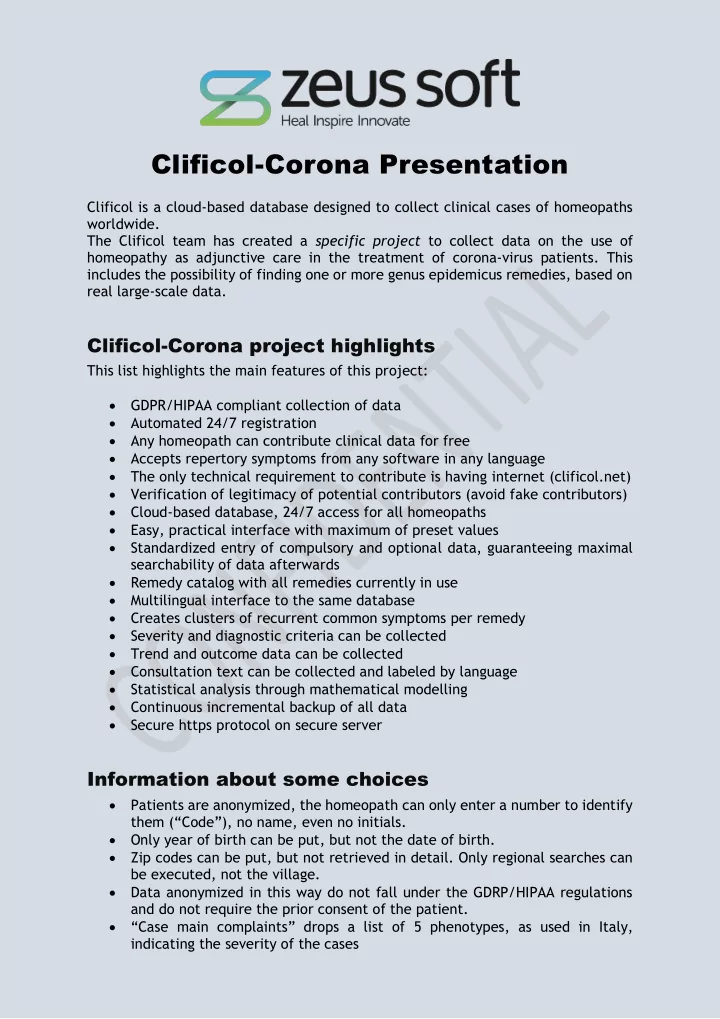

Clificol-Corona Presentation Clificol is a cloud-based database designed to collect clinical cases of homeopaths worldwide. The Clificol team has created a specific project to collect data on the use of homeopathy as adjunctive care in the treatment of corona-virus patients. This includes the possibility of finding one or more genus epidemicus remedies, based on real large-scale data. Clificol-Corona project highlights This list highlights the main features of this project: • GDPR/HIPAA compliant collection of data • Automated 24/7 registration • Any homeopath can contribute clinical data for free • Accepts repertory symptoms from any software in any language • The only technical requirement to contribute is having internet (clificol.net) • Verification of legitimacy of potential contributors (avoid fake contributors) • Cloud-based database, 24/7 access for all homeopaths • Easy, practical interface with maximum of preset values • Standardized entry of compulsory and optional data, guaranteeing maximal searchability of data afterwards • Remedy catalog with all remedies currently in use • Multilingual interface to the same database • Creates clusters of recurrent common symptoms per remedy • Severity and diagnostic criteria can be collected • Trend and outcome data can be collected • Consultation text can be collected and labeled by language • Statistical analysis through mathematical modelling • Continuous incremental backup of all data • Secure https protocol on secure server Information about some choices • Patients are anonymized, the homeopath can only enter a number to identify them (“Code”), no name, even no initials. • Only year of birth can be put, but not the date of birth. • Zip codes can be put, but not retrieved in detail. Only regional searches can be executed, not the village. • Data anonymized in this way do not fall under the GDRP/HIPAA regulations and do not require the prior consent of the patient. • “Case main complaints” drops a list of 5 phenotypes, as used in Italy, indicating the severity of the cases
• “Diagnostic accuracy” drops a list of diagnostic options ranging from confirmed by swap to epidemiologically suspect • “Co - morbidity” drops the list of known co -morbidities; more than one option can be selected • “In “Repertorial symptoms” symptoms from any repertory can be copy - pasted. They will be used for statistical analysis. • The user can indicate an intensity for each repertory symptom, which will allow a more relevant statistical analysis • On purpose, dosage has not been included, to minimize the efforts needed • At the follow up, some fields have been added: “Trend since previous consultation” (Glasgow scale) and “Final outcome” • At follow up, evaluation points are set at 1, 3 and 7 days • A 100-points VAS scale can be used at the first consultation and when the case is concluded • Adverse events can be reported • Boolean searches (and, or, not) on all fields will be possible • Advanced statistical analysis will help to suggest the best possible remedies and their symptom clusters, based on these data, successes as well as failures
Scientific Committee Clificol-Corona Project • Carlo Rezzani, Clificol Project Coordinator, Italy • Jean Pierre Jansen, ECH Provings Coordinator, Netherlands • Tiziana Di Giampietro, ECH Research Coordinator, Italy • Alex Tournier, HRI, Executive Director, England • Yvonne Fok, LMHI National Vice-President for China • Frederik Schroyens, Zeus Soft, Scientific Coordinator, Belgium
Recommend
More recommend